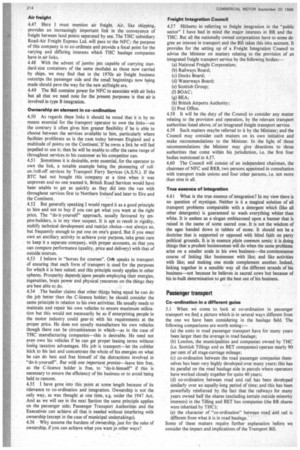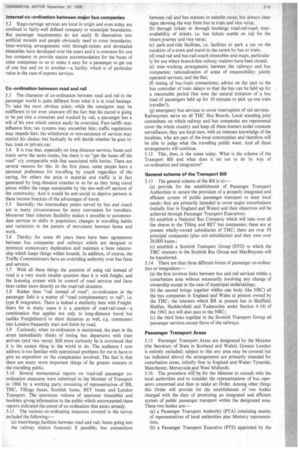Passenger transport
Page 218

Page 219

If you've noticed an error in this article please click here to report it so we can fix it.
Co-ordination in a different guise
5.1 When we come to took at co-ordination in passenger transport we find a picture which is in several ways different from the one we have been considering in the haulage field. The following comparisons are worth noting:—
(a) the units in road passenger transport have for many years been larger than the average in road haulage; (b) London, the municipalities and companies owned by THC (i.e. Scottish Tillings and ex BET companies) operate nearly 90 per cent of all stage-carriage mileage; (c) co-ordination between the road passenger companies themselves has been very highly developed over many years; this has its parallel on the road haulage side in parcels where operators have worked closely together for quite 40 years; (d) co-ordination, between road and rail has been developed similarly over an equally-long period of time; and this has been powerfully reinforced by the fact that the railways for many years owned half the shares (excluding certain outside minority interests) in the Tilling and BET bus companies (the BR shares were inherited by THC); (e) the character of "co-ordination" between road and rail is different from what it is in road haulage.
Some of these matters require further explanation before we consider the impact and implications of the Transport Bill.
Internal co-ordination between major bus companies
5.2 Stage-carriage services are local in origin and even today are confined to fairly-well defined company or municipal boundaries. But passenger requirements do not easily fit themselves into artificial moulds and people obviously need to cross boundaries. Inter-working arrangements with through-tickets and dovetailed timetables have developed over the years and it is common for one bus company to provide station accommodation for the buses of other companies so as to make it easy for a passenger to get out of one bus and on to another—a facility which is of particular value in the case of express services.


















































































































































































































































































































































































